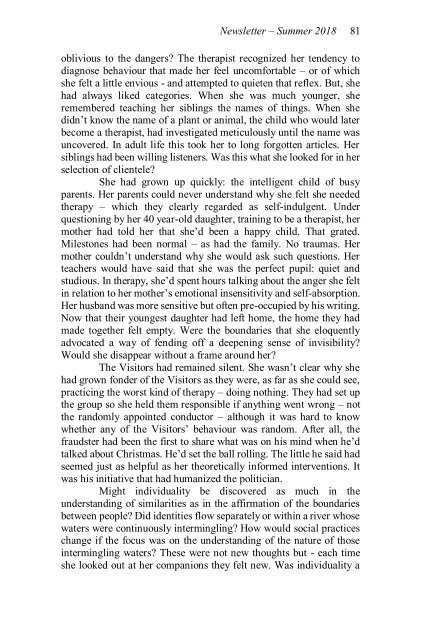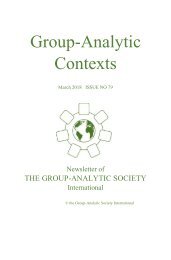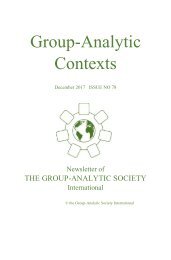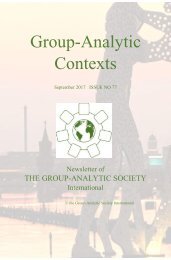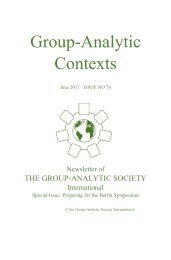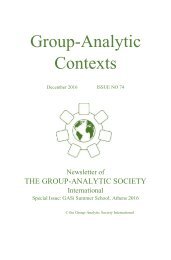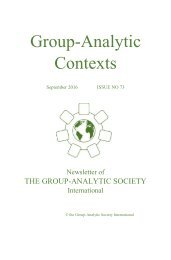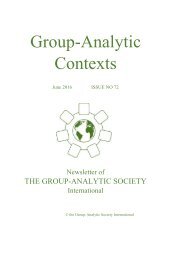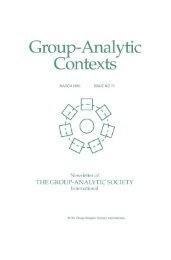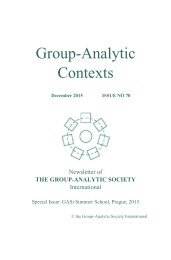Group-Analytic Contexts, Issue 80, June 2018
You also want an ePaper? Increase the reach of your titles
YUMPU automatically turns print PDFs into web optimized ePapers that Google loves.
Newsletter – Summer <strong>2018</strong> 81<br />
oblivious to the dangers? The therapist recognized her tendency to<br />
diagnose behaviour that made her feel uncomfortable – or of which<br />
she felt a little envious - and attempted to quieten that reflex. But, she<br />
had always liked categories. When she was much younger, she<br />
remembered teaching her siblings the names of things. When she<br />
didn’t know the name of a plant or animal, the child who would later<br />
become a therapist, had investigated meticulously until the name was<br />
uncovered. In adult life this took her to long forgotten articles. Her<br />
siblings had been willing listeners. Was this what she looked for in her<br />
selection of clientele?<br />
She had grown up quickly: the intelligent child of busy<br />
parents. Her parents could never understand why she felt she needed<br />
therapy – which they clearly regarded as self-indulgent. Under<br />
questioning by her 40 year-old daughter, training to be a therapist, her<br />
mother had told her that she’d been a happy child. That grated.<br />
Milestones had been normal – as had the family. No traumas. Her<br />
mother couldn’t understand why she would ask such questions. Her<br />
teachers would have said that she was the perfect pupil: quiet and<br />
studious. In therapy, she’d spent hours talking about the anger she felt<br />
in relation to her mother’s emotional insensitivity and self-absorption.<br />
Her husband was more sensitive but often pre-occupied by his writing.<br />
Now that their youngest daughter had left home, the home they had<br />
made together felt empty. Were the boundaries that she eloquently<br />
advocated a way of fending off a deepening sense of invisibility?<br />
Would she disappear without a frame around her?<br />
The Visitors had remained silent. She wasn’t clear why she<br />
had grown fonder of the Visitors as they were, as far as she could see,<br />
practicing the worst kind of therapy – doing nothing. They had set up<br />
the group so she held them responsible if anything went wrong – not<br />
the randomly appointed conductor – although it was hard to know<br />
whether any of the Visitors’ behaviour was random. After all, the<br />
fraudster had been the first to share what was on his mind when he’d<br />
talked about Christmas. He’d set the ball rolling. The little he said had<br />
seemed just as helpful as her theoretically informed interventions. It<br />
was his initiative that had humanized the politician.<br />
Might individuality be discovered as much in the<br />
understanding of similarities as in the affirmation of the boundaries<br />
between people? Did identities flow separately or within a river whose<br />
waters were continuously intermingling? How would social practices<br />
change if the focus was on the understanding of the nature of those<br />
intermingling waters? These were not new thoughts but - each time<br />
she looked out at her companions they felt new. Was individuality a


